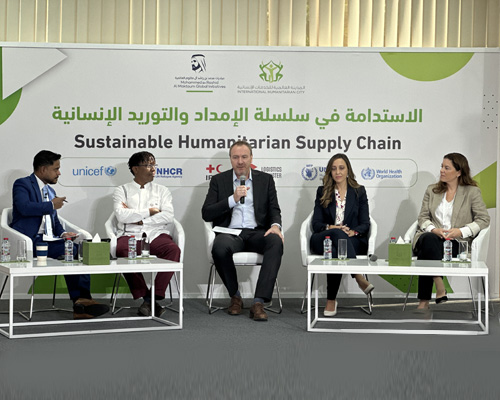Dubai Humanitarian, formerly known as the International Humanitarian City, took a significant step towards environmentally responsible aid delivery by hosting a symposium on Sustainable Supply Chain Management in Humanitarian Operations. Held at the organization's Centre of Knowledge and Development, the event attracted over 60 participants, fostering a collaborative environment for industry leaders, UN agencies, non-profit organizations, and government representatives.
Giuseppe Saba, CEO and Board Member of Dubai Humanitarian, emphasized the organization's unwavering commitment to sustainable practices in humanitarian efforts. "This symposium embodies our dedication to driving innovation, collaboration, and practical knowledge-sharing within the global humanitarian community," Saba remarked. He highlighted the diverse range of participants as a testament to Dubai Humanitarian's proactive approach and pioneering role in fostering partnerships for a more sustainable and efficient humanitarian response system, particularly at a time of escalating global need.
The symposium delved into the environmental impact of traditional humanitarian supply chains, where logistical necessities often overshadow environmental considerations. Discussions centered on exploring alternative solutions that minimize the carbon footprint of aid delivery. Experts addressed innovative approaches such as utilizing fuel-efficient transportation, exploring renewable energy sources for warehousing and distribution centers, and implementing responsible waste management practices throughout the supply chain.
A critical focus of the event was on promoting local and regional sourcing of critical supplies. This approach not only reduces transportation emissions but also strengthens local economies within crisis-affected regions. Participants explored strategies for building the capacity of local producers to meet the quality and quantity standards required for humanitarian operations.
The symposium acknowledged the financial implications of adopting sustainable practices. Open discussions addressed potential funding mechanisms to support the development and implementation of eco-conscious supply chain initiatives. Participants explored the possibility of incorporating environmental considerations into grant proposals and fundraising strategies, encouraging greater donor support for sustainable solutions.
Dubai Humanitarian's initiative serves as a beacon of hope for a future where humanitarian aid delivery goes hand-in-hand with environmental responsibility. The symposium's emphasis on collaboration and knowledge-sharing paves the way for a more sustainable and efficient global humanitarian response system, ensuring critical aid reaches those in need while minimizing the environmental footprint.

